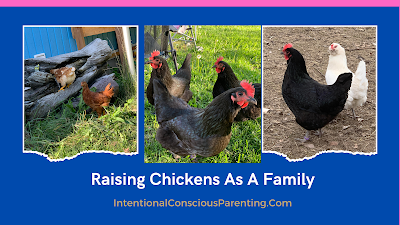Are you considering raising chickens with your children? It's a fun and rewarding activity that can teach your kids important life skills while providing fresh eggs for your family. In this post, we'll discuss the benefits of raising chickens with children and provide tips for getting started.
Firstly, it's important to research your local laws and regulations regarding backyard chickens. Many cities have ordinances that limit the number of chickens you can keep and require certain coop specifications. Once you've done your research, it's time to start planning your chicken adventure!
So, what are the benefits of raising chickens with children? For one, it's a great way to teach your kids responsibility and compassion for animals. They'll learn how to care for living creatures and see the rewards of their hard work when the chickens lay eggs. Plus, it's a fun way to spend time together as a family.
Choosing Chickens
Before raising chickens, you'll need to choose the right breed. Some breeds are better for laying eggs and some are better for meat production. Depending on your climate and location, you may need to choose a breed that is more cold-hardy or heat-tolerant. Since I live in the mountains of Montana I have Astralorps, An Auracana, Rhode Island Red, and a Golden Comet. They all have handled our long cold winters just fine.
When choosing chickens, consider their temperament as well. Some breeds are more docile and better suited for children, while others can be more aggressive. You'll also want to consider the size of the breed, as larger chickens may be more difficult for children to handle. Our Golden Comet is the sweetest chicken we have. She always wants attention.
Ultimately, the breed depends on your specific needs and preferences. Do your research and talk to other backyard chicken owners to determine which breed is right for your family.
Building a Coop
Once you've chosen your chickens, it's time to build a coop. Your coop should provide shelter and protection for your chickens, as well as plenty of space for them to move around. It should also be easy to clean and maintain.
If you're handy, you can build a coop yourself using plans you find online or in books. Alternatively, you can purchase a pre-made coop from a farm supply store or online retailer. Whatever option you choose, make sure the coop is safe and secure for your chickens.
You'll also need to provide a run for your chickens to exercise and forage in. This can be a fenced-in area attached to the coop or a separate space in your backyard. Make sure the run is secure and predator-proof. We have a nice dry big pen that houses their insulated coops. The giant pen is wrapped in plastic and layered with straw for extra protection from the elements.
My family chooses to let our chickens free range during the day in our large backyard, then at the end of the day they head back into their pen which is locked up for the night.
Feeding and Watering
Feeding your chickens is an important aspect of raising them. Chickens require a balanced diet that includes protein, calcium, and other nutrients. You can purchase chicken feed from a farm supply store or online retailer.
In addition to feeding, your chickens need access to fresh water at all times. You can use a waterer specifically designed for chickens or a shallow dish. Make sure to clean and refill the water regularly.
Consider supplementing your chickens' diet with kitchen scraps and garden produce. Chickens love fruits and vegetables, and it's a great way to reduce food waste. I’ve created a fun chicken snack cheat sheet to take the guesswork out of what you can and can not feed your chickens.
Egg Production
One of the benefits of raising chickens is the fresh eggs they provide. Depending on the breed, chickens can lay anywhere from 200 to 300 eggs per year.
Make sure to collect eggs regularly to prevent them from going bad. You can store eggs in the refrigerator for up to a month. If you have excess eggs, consider selling them or giving them to friends and neighbors.
Remember that not all chickens will lay eggs consistently. Some breeds are more reliable egg layers than others. If you're primarily interested in egg production, do your research and choose a breed that is known for laying well.
Wellness
As with any animal, it's important to keep your chickens healthy and happy.
Chickens are susceptible to certain diseases and parasites, so it's important to monitor their health closely. Look for signs of illness such as lethargy, loss of appetite, and abnormal behavior.
There are also preventative measures you can take to keep your chickens healthy. This includes providing them with a safe living environment, a balanced diet, keeping their living area clean, and providing plenty of fresh water.
Teaching Children Responsibility
Raising chickens with children is a great way to teach them responsibility. They'll learn how to care for living creatures and see the results of their hard work when the chickens lay eggs.
Make sure to assign age-appropriate tasks to your children, such as collecting eggs, refilling water, and feeding the chickens. Encourage them to take ownership of their responsibilities and take pride in their work.
Chickens teach children about the circle of life and where their food comes from.
Safety Precautions
Make sure your children understand the importance of washing their hands and not putting their hands in their mouths after handling chickens. You'll also want to supervise younger children around the chickens to prevent accidents.
Additionally, make sure your coop and run are secure and predator-proof. This will help prevent predators such as raccoons and foxes from getting into the coop and harming your chickens.
Troubleshooting Common Issues
As with any animal, there are certain issues you may encounter when raising chickens. Some common issues include egg-laying problems, health issues, and predator attacks.
If you encounter any problems, don't panic. There are plenty of resources available to help you troubleshoot and solve the issue. You can consult books, online forums, and other backyard chicken owners for advice.
Remember that raising chickens is a learning process, and you'll likely encounter some bumps along the way. But with patience and perseverance, you can raise healthy and happy chickens with your children.



No comments:
Post a Comment